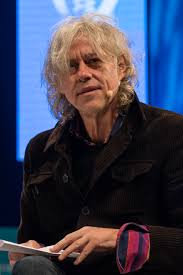The Impact of Bob Geldof: Musician and Humanitarian

Introduction
Bob Geldof, an Irish singer-songwriter, and political activist, has remained a significant figure in both the music industry and humanitarian efforts for decades. Best known for his role in the band The Boomtown Rats, Geldof’s impact extends far beyond music. His activism in combating global poverty—especially through the Live Aid concerts—has made him a symbol of social change. As we navigate through changing global landscapes, it’s crucial to reflect on his contributions and the continuing relevance of his work.
Musical Career and Activism
Geldof rose to international fame in the late 1970s and early 1980s with hits like “I Don’t Like Mondays” and “Rat Trap.” However, his transition into activism began during the Ethiopian famine in the mid-1980s. Frustrated by the world’s inaction, he co-founded Band Aid and organised Live Aid in 1985, raising over $125 million for famine relief in Africa. His efforts mobilised a generation and showcased how the music industry could be used to address critical global issues.
Recent Developments
In recent years, Geldof has continued to be vocal about humanitarian issues. In 2023, he participated in a charity concert for famine relief in East Africa, aiming to address the ongoing crises exacerbated by climate change and political instability. His message remains timely, as conflicts and environmental changes continue to impact the most vulnerable populations worldwide. Geldof’s calls for action remind us that fighting poverty and inequality is still a pressing responsibility for all.
Significance and Legacy
Geldof’s legacy goes beyond his music and immediate charitable efforts; it has set a precedent for artists leveraging their platforms for social change. His work has inspired numerous initiatives aimed at poverty alleviation and has encouraged many in the entertainment industry to consider their social responsibilities. As he continues to advocate for the world’s impoverished, his influence serves as a reminder that activism can take many forms and that each individual can contribute to change.
Conclusion
The importance of Bob Geldof’s contributions is more relevant than ever. His determination to address hunger and poverty through music and activism illustrates the powerful role of artists in shaping global discourse. As challenges persist, Geldof’s example offers hope and encourages continued collective action against social injustices. For readers, the takeaway is clear: being informed and engaged can lead to meaningful impacts in our communities and beyond.









